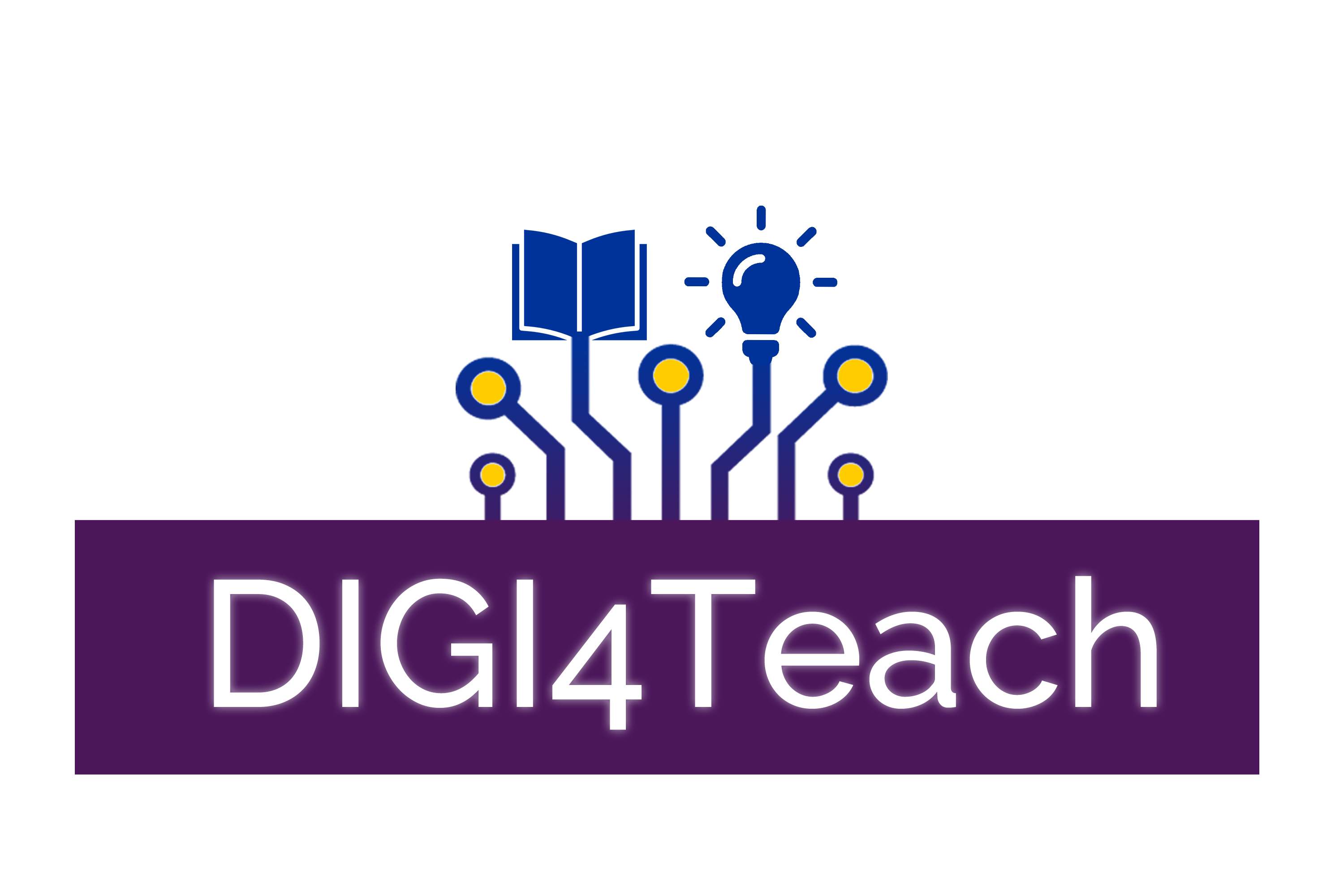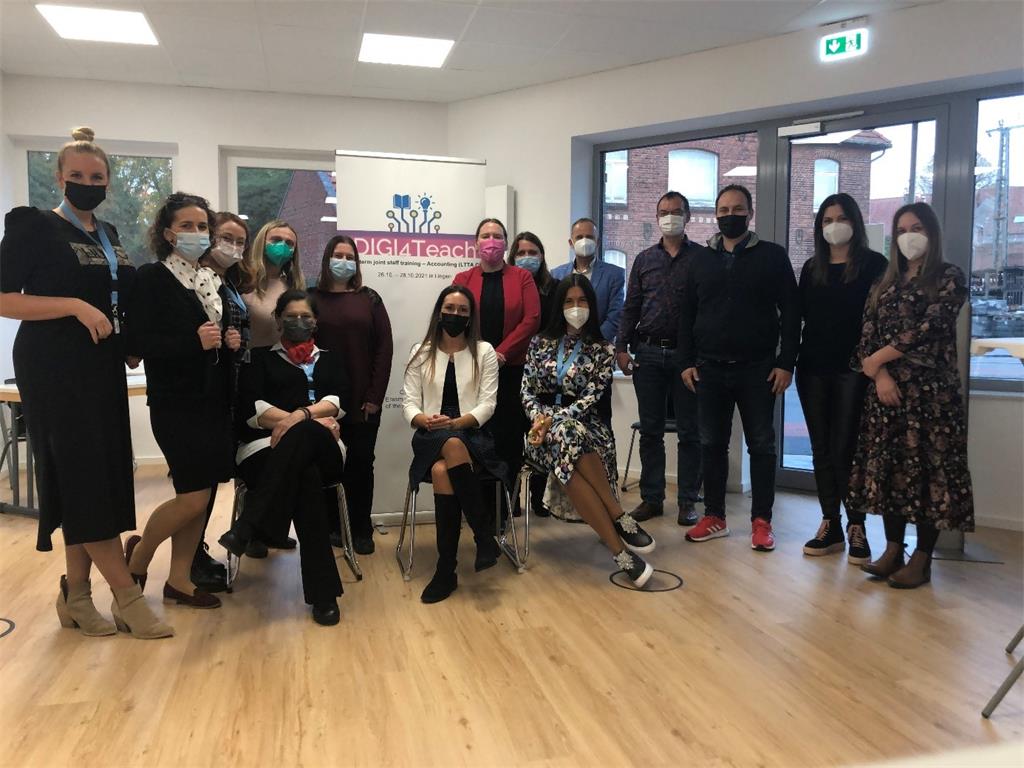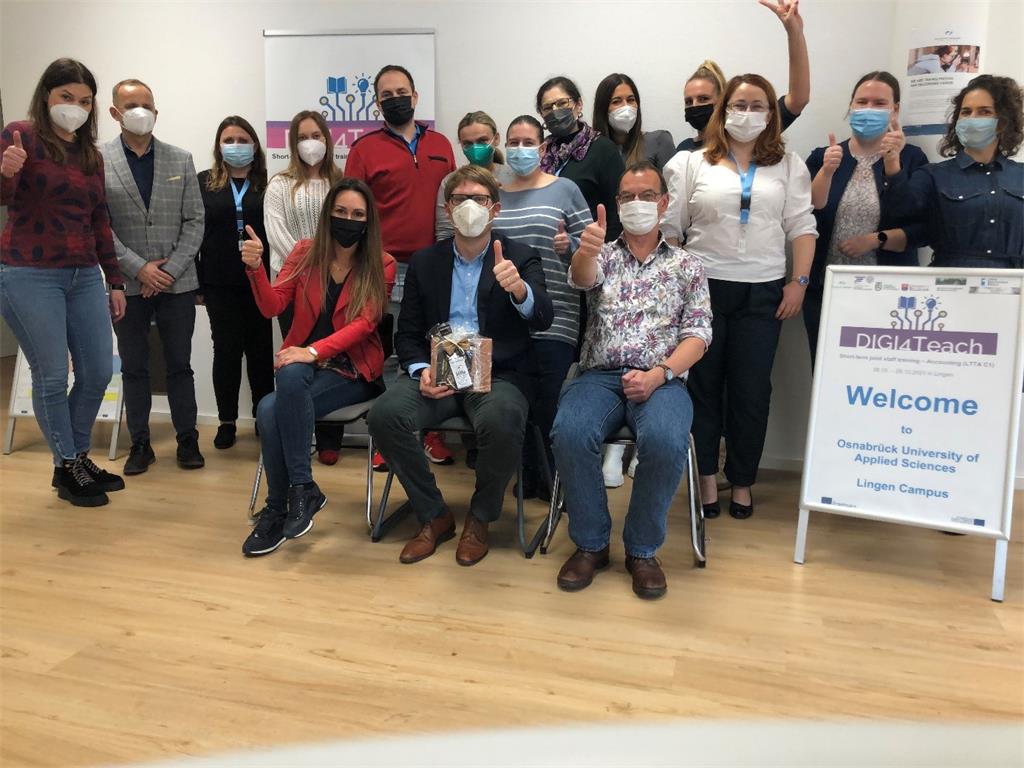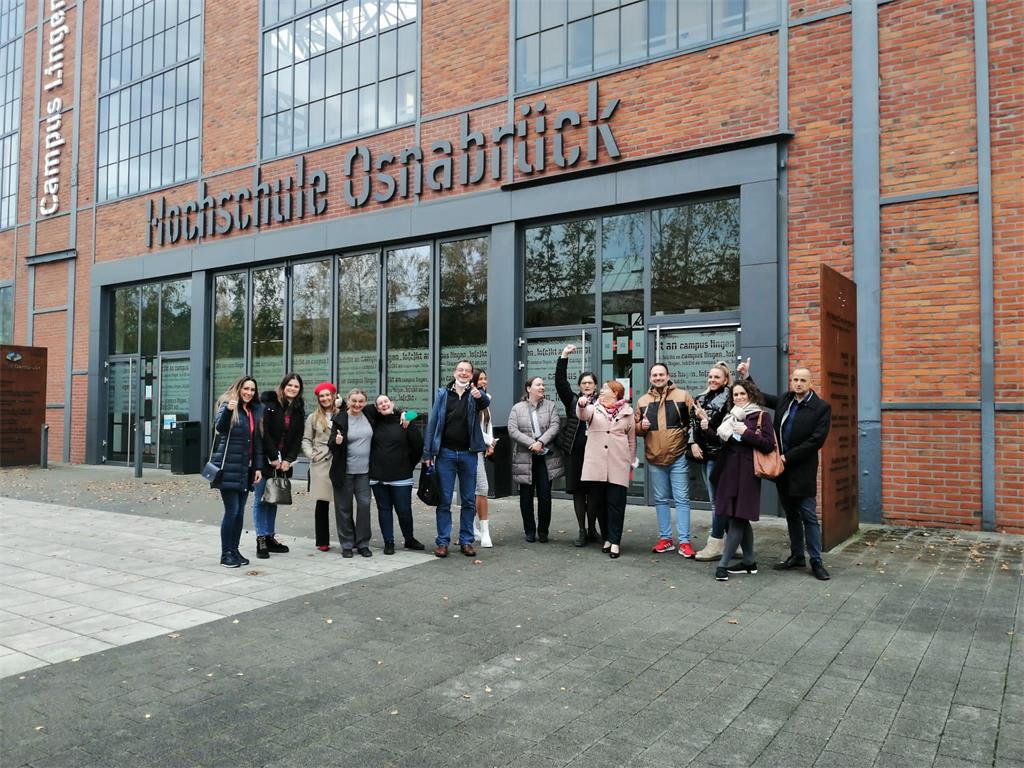 Despite all the challenges caused by the Covid-19 pandemic, the first project learning, teaching, and training activity was successfully organized within the project of strategic partnership co-financed by Erasmus+ entitled "Challenges and practices of teaching economic disciplines in era of digitalization" - DIGI4Teach. The activity called Short-term joint staff training - Accounting (LTTA C1) was held at the Hochschule Osnabrück, University of Applied Sciences, Campus Lingen, Germany in the period from 26th to 28th October 2021. The activities were attended by two members of each of the seven organizations involved in the project, which represents a total of 14 realized mobilities, and the activities were also attended by members of the host university.
Despite all the challenges caused by the Covid-19 pandemic, the first project learning, teaching, and training activity was successfully organized within the project of strategic partnership co-financed by Erasmus+ entitled "Challenges and practices of teaching economic disciplines in era of digitalization" - DIGI4Teach. The activity called Short-term joint staff training - Accounting (LTTA C1) was held at the Hochschule Osnabrück, University of Applied Sciences, Campus Lingen, Germany in the period from 26th to 28th October 2021. The activities were attended by two members of each of the seven organizations involved in the project, which represents a total of 14 realized mobilities, and the activities were also attended by members of the host university. The first lecture on "Impressions from Covid driven digitized semesters" was given by the Dean of Studies at the University of Applied Sciences, Prof. Dr. Michael Ryba. Afterwards, a lecture on "Smart success and aspects of digitized self-learning" was given by Kathrin Wanninger, a Research Associate from the Learning Center at the University of Applied Sciences. The project activities were then continued with team building, the purpose of which was to get to know and bring together the participants of the activity, held by the professional trainer Stefanie Drees. In the second part of the day, the guest lecturer was Daniel Struckmeyer, a consultant at DATEV eG, who gave a lecture on "Digitized resources in accounting for vocational schools and universities - Status quo and future perspectives“. DATEV eG, among other things in its portfolio, offers software for accounting, personnel management, business consulting, tax computation, office and company organization. After an interesting lecture, the topic of applying DATEV software was continued, since it is also actively used by professors from the University of Applied Sciences. Prof. Dr. Gunther Meeh-Bunse, Local Project Manager at the University of Applied Sciences, Prof. Dr. Marion Titgemeyer and Katja Luer, LL.M. introduced the participants to their own example of practical teaching using the DATEV system through a lecture entitled "Combining accounting and taxation in digitized teaching". At the very end of the working day, the representative of the University of Belgrade, Assistant Professor Dragana Draganac, PhD presented digital teaching methods and tools in accounting that are applied at the Faculty of Economics in Belgrade. The first project day ended with a welcome dinner at the Alte Posthalterei restaurant and an informal gathering of all participants.
The first lecture on "Impressions from Covid driven digitized semesters" was given by the Dean of Studies at the University of Applied Sciences, Prof. Dr. Michael Ryba. Afterwards, a lecture on "Smart success and aspects of digitized self-learning" was given by Kathrin Wanninger, a Research Associate from the Learning Center at the University of Applied Sciences. The project activities were then continued with team building, the purpose of which was to get to know and bring together the participants of the activity, held by the professional trainer Stefanie Drees. In the second part of the day, the guest lecturer was Daniel Struckmeyer, a consultant at DATEV eG, who gave a lecture on "Digitized resources in accounting for vocational schools and universities - Status quo and future perspectives“. DATEV eG, among other things in its portfolio, offers software for accounting, personnel management, business consulting, tax computation, office and company organization. After an interesting lecture, the topic of applying DATEV software was continued, since it is also actively used by professors from the University of Applied Sciences. Prof. Dr. Gunther Meeh-Bunse, Local Project Manager at the University of Applied Sciences, Prof. Dr. Marion Titgemeyer and Katja Luer, LL.M. introduced the participants to their own example of practical teaching using the DATEV system through a lecture entitled "Combining accounting and taxation in digitized teaching". At the very end of the working day, the representative of the University of Belgrade, Assistant Professor Dragana Draganac, PhD presented digital teaching methods and tools in accounting that are applied at the Faculty of Economics in Belgrade. The first project day ended with a welcome dinner at the Alte Posthalterei restaurant and an informal gathering of all participants.
The second day began with a tour of the BBS Lingen Wirtschaft Vocational High School. The host was headmaster Heinz Gebbeken who presented examples of practical teaching methods through the digital aspect of modern teaching. After visiting the high school, a lecture on the application of the SAP accounting information system was given at the Lingen Campus by Marianne Hennies and Gladies Merheb on behalf of Refratechnik Holding GmbH. The topic of the lecture was "Corporate Reporting - Digitized State of the Art and Implications for Young Accounting Professionals". After the lunch break, the guest lecturer was tax law expert Tim Lühn, LL.M., on behalf of Volbers Vehmeyer & Partner, a tax advisory and audit firm. The lecture was on the topic "Innovative accounting and tax advisory in Lingen - challenges in cross border (tax) and accounting with special emphasis on IT tools". In the second part of the day, the participants visited the library within the Lingen Campus where the library manager presented the digital aspect of the books and scientific papers searching engine and took the participants through the library. Upon returning to the Campus building where the lectures were held, representatives of the project leader, University of Zagreb, Faculty of Economics and Business, Assistant Professor Mateja Brozović, PhD and Postdoctoral Researcher Ana Rep, PhD, as well as the representatives of the First School of Economics Zagreb, Romana Rusek, MA and Tomislav Polić, MA, presented digital methods and tools of teaching accounting that are applied in their organizations.

The last day of the activity began with a lecture on "Teaching the digitized case study DATEV - accounting for SMEs - Müller & Thurgau" held by Prof. Dr. Gunther Meeh-Bunse from the University of Applied Sciences. Participants had the opportunity to attend and actively participate in the class and, together with students, get acquainted with the accounting program DATEV. In the second part of the day, Aron Rodriguez, Account Manager - Academics and Michelle Karavias, Industry Research Head, from the globally known agency Fitch Ratings and Fitch Solutions, joined the video call from London with the topic “Rating Agencies as Receiver of Accounting Reporting: The Rating Process and the Digitized Fitch Connect Data Base”. After an interesting lecture, the participants visited the TPZ Theater, which was presented by the theater director Nils Hanraets. Participants were also able to hear about theater pedagogy through a very useful workshop that is applicable in all aspects of team building and working with all ages. After an interesting workshop, the presentation of digital teaching methods and the application of digital tools at the Cracow University of Economics was held by Prof. dr hab. Agnieszka Głodowska. The last project activity was in the form of a historical and cultural tour of the city of Lingen, where participants were introduced to the historical culture and heritage of the city of Lingen. The tour was arranged by Kivelinge city tour and farewell, which ended the first learning, teaching and training activity within the DIGI4Teach project. All participants left with a lot of new knowledge, experience and acquaintances that enriched their professional and private status. Also, all participants are sincerely grateful to Prof. Dr. Gunther Meeh-Bunse and his entire team for a great organization and a multitude of activities.

 ** The European Commission's support for the production of this publication does not constitute an endorsement of the contents, which reflect the views only of the authors, and the Commission cannot be held responsible for any use which may be made of the information contained therein.
** The European Commission's support for the production of this publication does not constitute an endorsement of the contents, which reflect the views only of the authors, and the Commission cannot be held responsible for any use which may be made of the information contained therein.